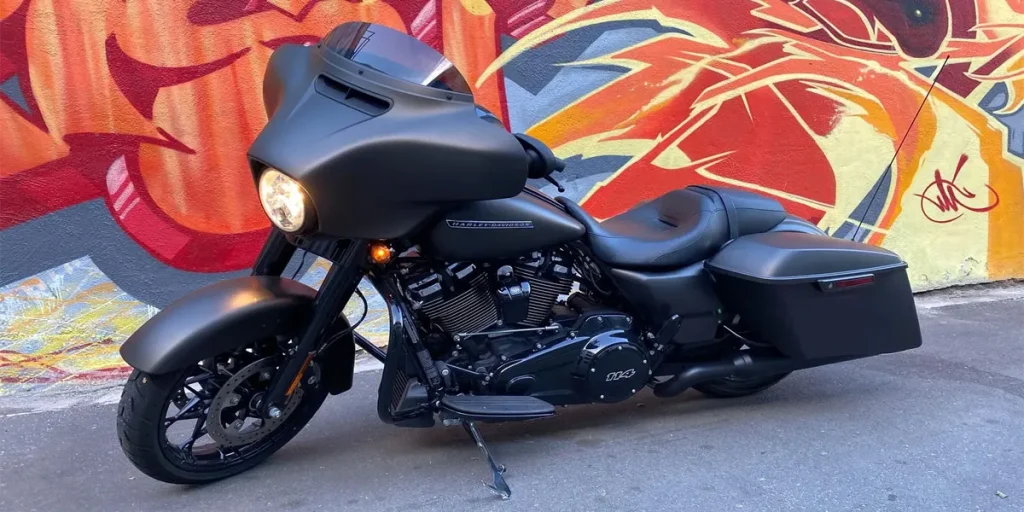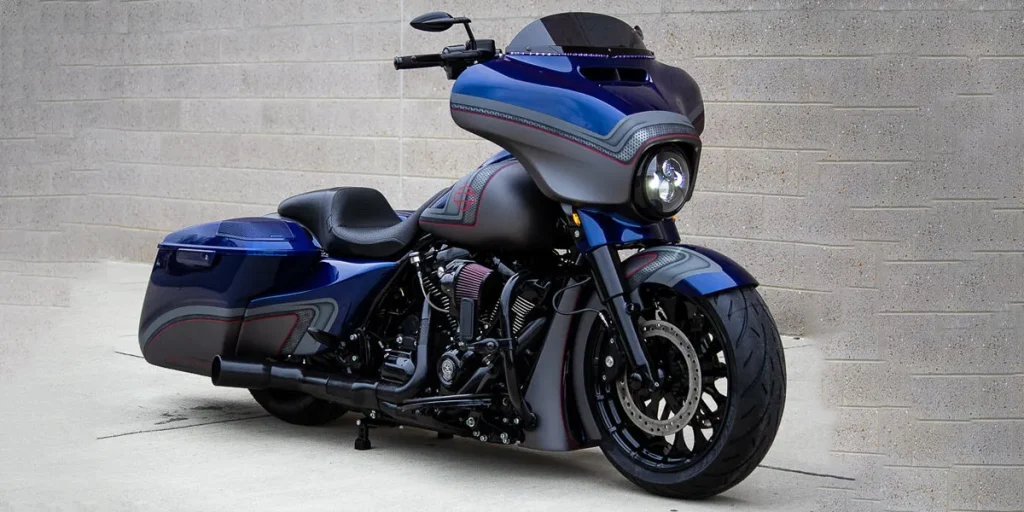A Harley-Davidson Street Glide typically weighs around 796 pounds when wet. Its curb weight includes all necessary operational fluids and a full gas tank.
The Harley-Davidson Street Glide stands out as a heavyweight player in the touring motorcycle category, embraced by riders who adore its mix of comfort and style.
With its sleek design and ample features, this motorcycle has become a staple for long-distance enthusiasts and weekend warriors alike.
The bike merges an impressive array of modern amenities with the classic Harley rumble and aesthetics, ensuring its status as a sought-after model for those craving the open road.
Whether navigating city streets or cruising on the highway, the Street Glide’s weight contributes to its stable and commanding presence, making every ride an adventure worth remembering.
The Street Glide Legacy
The Harley-Davidson Street Glide stands as a testament to motorcycle innovation and culture.
With its unmistakable silhouette and rumbling presence, it embodies the spirit of the open road.
Enthusiasts recognize not just its weight as a measure of steel and chrome but the gravity it holds in biking lore. Let’s throttle through the history and growth of this iconic bike.
Origins Of The Iconic Bike
The birth of the Street Glide traces back to the heart of American motorcycle craftsmanship.
It debuted to the world as a sleek, touring bike under the renowned Harley-Davidson name.
Its creation sprung from the demand for a bike that combined comfort and style for long rides.
Picture chrome glinting in sunlight and leather seats calling for the horizon – that is the essence of the original Street Glide.
Evolution Through The Years
Like a living legend, the Street Glide evolved with time. Each year brought enhancements, from engine upgrades to improved sound systems.
Riders witnessed advancements in performance, technology, and design.
- Better engines offered more power and smoother rides.
- Infotainment systems became part of the ride, connecting riders to music and navigation.
- Aerodynamics improved, making the Street Glide a favorite for those seeking speed and stability.
Today, it stand as more than a motorcycle; it’s a journey of mechanical excellence that has manned the roads for decades.
Breaking Down The Bulk

Curious about the Street Glide’s weight? Riders often consider the heft of their bike.
Let’s dig into what makes this bike tip the scale.
Factors Affecting Motorcycle Weight
A variety of elements play a part in a motorcycle’s weight.
- Engine Size: Larger engines weigh more.
- Accessories: Extras add pounds.
- Fluids: Gasoline and oil contribute to overall mass.
Fuel Type: Electric vs. gasoline can differ in mass.
Frame and Wheels: Stronger materials can increase weight.
Material Choices And Design
Materials in manufacturing are crucial for weight.
| Material | Weight Influence |
|---|---|
| Steel | Durable, heavier |
| Aluminum | Lightweight, less bulk |
| Carbon Fiber | Expensive, reduces weight |
The design also impacts the weight.
- Chassis Design: Shapes and structures influence heft.
- Aerodynamics: Streamlined features can cut excess.
Measuring The Street Glide

The iconic Harley-Davidson Street Glide is a symbol of freedom on the open road. Knowing its weight is crucial for both new and experienced riders.
Let’s dive into the facts and figures that define the weight of this classic motorcycle.
Understanding Dry Vs Wet Weight
Dry weight refers to the motorcycle without any fluids. This includes fuel, oil, or coolant. It’s the weight of the bike as it comes from the factory.
Wet weight, on the other hand, is the motorcycle’s weight with all necessary fluids. It represents a bike ready to ride. It’s heavier than the dry weight due to these fluids.
Actual Weights Of Different Model Years
Street Glides have evolved over the years, with weights slightly varying across models. Here’s a breakdown:
| Model Year | Dry Weight | Wet Weight |
|---|---|---|
| 2010 Street Glide | 775 lbs | 810 lbs |
| 2015 Street Glide | 775 lbs | 810 lbs |
| 2020 Street Glide | 796 lbs | 836 lbs |
These numbers highlight the Street Glide’s solid build and presence on the road. The bike remains a heavyweight favorite among enthusiasts.
Street Glide And Its Peers
Digging into the Comparative Heft, when motorcycle enthusiasts consider their dream ride, weight plays a pivotal role.
A heavyweight bike like the Street Glide offers a different experience compared to its lighter counterparts.
Understanding how the Street Glide weighs in against other motorcycles is crucial for those interested in the touring bike category.
How It Stacks Up Against Other Harleys
The Street Glide stands as a favorite among Harley-Davidson aficionados. Let’s size it up against fellow Harleys:
| Model | Weight |
|---|---|
| Street Glide | 796 lbs |
| Road King | 798 lbs |
| Iron 883 | 564 lbs |
| Softail Deluxe | 697 lbs |
The table above displays how the Street Glide sits comfortably within the weight spectrum of Harley-Davidson motorcycles.
Average Weights In The Touring Bike Category
In the broader realm of touring motorcycles, weight charts reflect various designs and purposes. See how the Street Glide fares among peers:
- Honda Goldwing: 787 lbs
- BMW K 1600 GTL: 772 lbs
- Indian Chieftain Dark Horse: 796 lbs
These numbers show that the Street Glide aligns closely with industry standards for heft in touring bikes.
The Impact Of Weight On Performance
The Harley-Davidson Street Glide is a heavyweight tourer that’s known for its solid build and smooth ride.
The weight of a motorcycle plays a crucial role in its performance on the road. It affects how the bike handles, its stability, and the ease with which a rider can maneuver it.
This section dives into how a Street Glide’s heft influences its road manners.
Handling And Manoeuvrability
Mastery of a motorcycle’s weight is essential for safe and enjoyable riding. Heavier bikes like the Street Glide demand skill when navigating corners and tight spaces.
Their mass lends a stable feel at high speeds yet requires more muscle to steer and balance at low speeds.
- Increased stability on highways
- More effort for cornering and tight maneuvers
- Easier cruising with less wind impact
The Role Of Weight In Long-distance Touring
Weight can be an ally or an adversary on long journeys. For long-distance touring, motorcycles like the Street Glide offer comfort and fewer vibrations, thanks to their mass.
However, this same weight can challenge riders during extended periods of riding, especially when fatigue sets in.
| Advantage | Disadvantage |
|---|---|
| Smooth ride over uneven surfaces | More tiring for rider over long periods |
| Better wind resistance | Harder to push or lift if needed |
Modifying Street Glide Weight
Harley-Davidson’s Street Glide is a popular beast on roads. Riders often customize it. Knowing how these changes affect weight is key.
Aftermarket Additions And Subtractions
Many riders love to tweak their ride. Aftermarket parts can add or reduce weight. It’s critical to track these changes. Here’s a look at common additions:
- Exhaust Systems: Swapping for a lighter setup can shed pounds.
- Bigger Tanks: Fuel capacity increases may add significant weight.
- Custom Seats: A change here might save or add a few pounds.
But, just as parts can add, they can also subtract weight:
- Lightweight Wheels: An upgrade here can reduce unsprung mass.
- Carbon Fiber Parts: These offer strength without the heft of metal.
Balancing Customization With Weight Considerations
Customization is about balance. A lighter Street Glide moves quicker but beware. Too light and the ride could suffer, especially on windy days. On the flip side, adding too much turns agile into sluggish.
Keep these pointers in mind:
- Set a weight goal before customizing.
- Compare part weights. Lightweight doesn’t always mean better.
- Remember the weight distribution. It affects handling.
By being mindful of these considerations, you can customize your Street Glide to not just look good, but feel good on the road as well.
FAQs About the Weight of a Street Glide
What Is The Typical Weight Of A Street Glide?
The typical weight of a Harley-Davidson Street Glide is around 829 pounds when ready to ride. This includes all fluids and a full tank of gas.
How Does Street Glide Weight Affect Handling?
Weight affects handling; Street Glides, being heavier bikes, offer stable highway rides but demand more effort for low-speed maneuvers.
Their heft can be beneficial for smooth cruising.
Can The Weight Of A Street Glide Vary By Model?
Yes, the weight can vary slightly by model year and any additional factory options or aftermarket accessories installed, which can add to the overall mass of the bike.
What’s The Difference In Weight Between Street Glide And Ultra?
The Street Glide is generally lighter than an Ultra Classic, with the Ultra averaging about 100 pounds more due to additional features aimed at comfort and long-distance touring.
Conclusion
Understanding the weight of a Street Glide is crucial for riders. It ensures a match with their handling preferences and transport needs.
This Harley-Davidson classic typically tips the scales at around 800 pounds. Always check the specific model for exact figures before making your decision.
Ride on, knowing you’re well-informed about your bike’s heft!
Resources:
https://www.harley-davidson.com/us/en/motorcycles/street-glide.html
